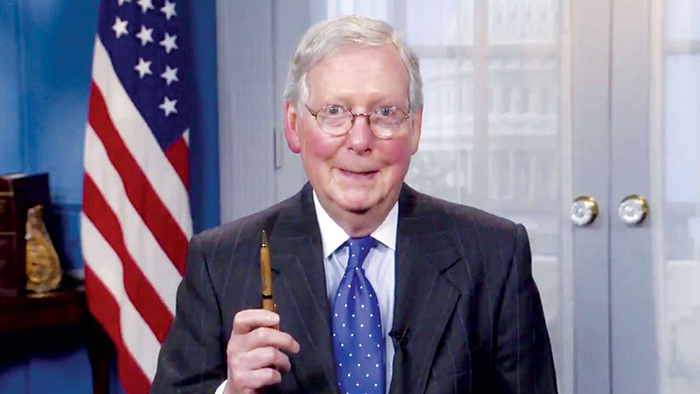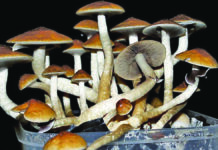The Senate minority leader remains a prohibitionist
A thought exercise: what if someone had approached Mitch McConnell in 2017 or 2018, when he was pushing—on behalf of farmers and lobbyists in his home state of Kentucky—to legalize hemp, and told him that in a few years there would be a nationwide explosion of hemp-based products that can get people high?
Given McConnell’s total lack of conviction about everything other than maintaining his own power in the Republican Party and in the Senate, it might not have made much difference. But it’s still fun to imagine how he might have reacted if someone had told him, “By the way, Mr. Majority Leader, hemp can get folks high.” On the other hand, maybe he did know and just didn’t care.
When it comes to pot, the cannabis plant with lots of THC in it, McConnell, now the Senate minority leader, remains a steadfast prohibitionist, despite his personal shepherding of hemp legalization in the 2018 Farm Bill. He most likely doesn’t care one way or the other whether anyone uses weed, but he’s calculated that his voter base in Kentucky, which skews old, wants him to continue to oppose legalization and other reforms. He also likes to use cannabis as a political cudgel to paint Democrats as flighty and unserious.
So there’s more than a little irony behind the fact that it’s largely thanks to McConnell that people across the country, including people who live in states where pot is still totally illegal, can easily obtain hemp-derived plants that contain THC and can get people wasted. It’s easier to obtain them, in fact, than it is to obtain legal weed in legal states where the cannabis industry is heavily regulated. In those states, in order to buy legal cannabis, people have to show ID, even when buying online. But anybody anywhere can buy hemp-based products online and have them delivered by mail with very little friction.
In legalizing hemp—a highly versatile crop from which a huge range of products are manufactured—the Farm Bill left a giant loophole. Hemp contains only trace amounts of THC, which is the main component of cannabis that causes a high. The Farm Bill included a limit on how much THC hemp could contain, but it specified only one type of THC: delta 9. It said nothing about other types of THC. Entrepreneurs, many of them fly-by-night operators, popped up like kudzu to essentially concentrate the THC in hemp to produce intoxicating products based on other types of THC: mainly, delta 8. The legality of this is in dispute, but for the most part these operators operate with impunity.
But now a new Farm Bill is being written. The schedule is supposed to be every five years, though in recent times that deadline was missed in a few instances, as it was in 2017. That might happen again as members of the House Freedom Caucus, pretending to be worried about “spending” on things like food stamps, are already making trouble for the Republicans who are ready to join the Democrats in getting the thing passed. But assuming it passes, the bill might contain new restrictions on hemp-derived intoxicants.
The bill might also contain regulations on CBD, another component of hemp that is perfectly legal, and non-intoxicating, but which is almost entirely unregulated—much to the legitimate CBD industry’s chagrin. Lots of CBD peddlers are selling stuff that doesn’t contain much—or, in some cases, any—CBD in it, leaving consumers befuddled and besmirching the reputation of the industry as a whole.
The Food and Drug Administration supposedly worked for several years on creating regulations for hemp-derived products, but in January it basically decided the whole thing was just too complicated, and kicked the issue over to Congress to answer such questions as to whether CBD is a drug or a dietary supplement. Given the appalling state of affairs on Capitol Hill, hopes for a quick resolution to these problems have waned. Consider that House Member James Comer, Republican of Kentucky, is one of the main players in this saga and is running the main committee “investigating” the matter. His biggest claim to fame is going on TV to spread conspiracy theories about President Biden’s supposed corruption regarding Hunter’s laptop.
Neither the hemp industry nor consumers have any reason to be optimistic that these questions will be resolved any time soon.








